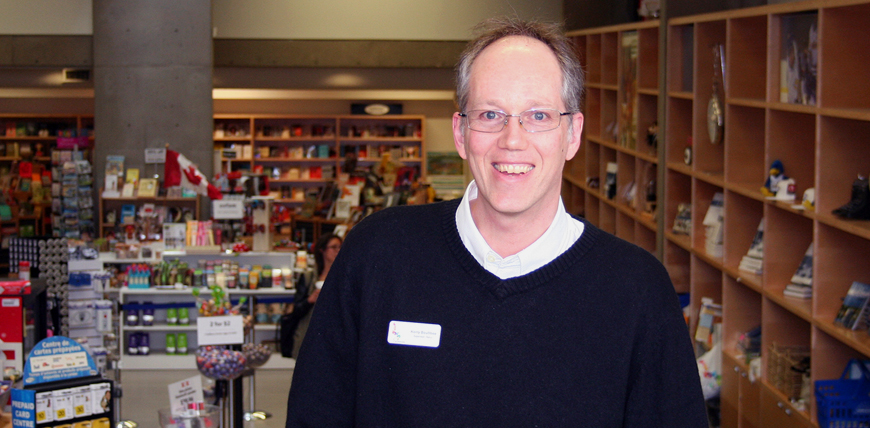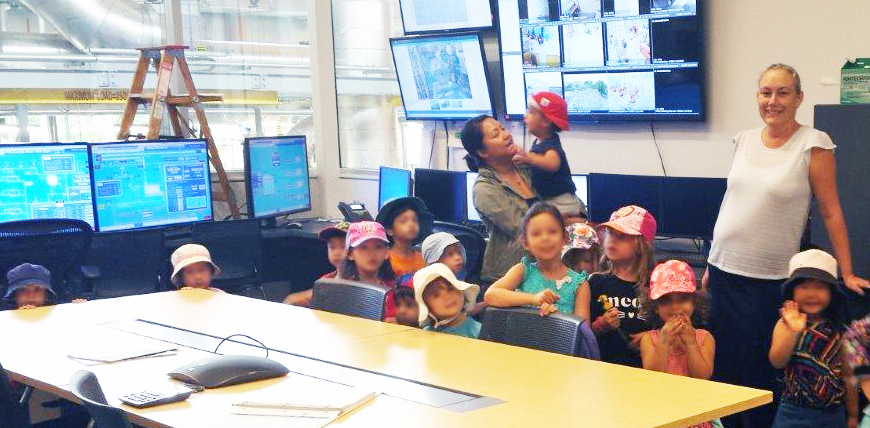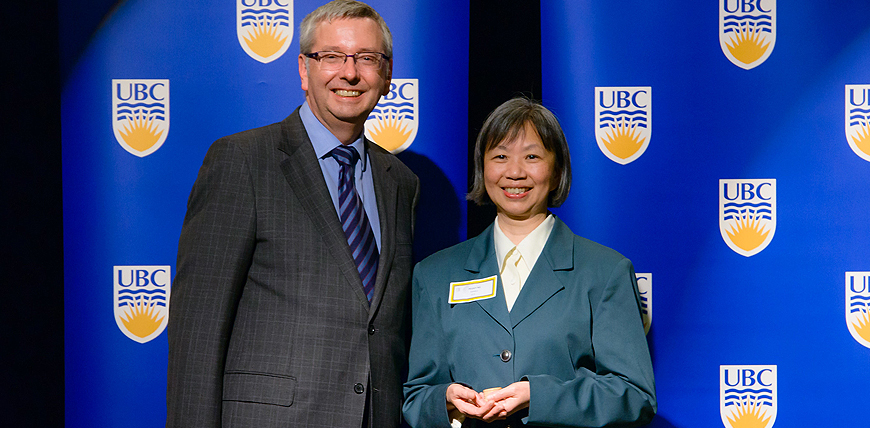
The Sustainability Coordinator Program has grown over the years to become what is now a network of 120 coordinators working in offices, academic departments, operational units, and laboratories across the UBC Vancouver campus. The program provides these volunteers with opportunities and resources to promote and implement sustainable practices where they work.
Celebrating twenty years
"Over the past 20 years, Sustainability Coordinators have demonstrated how individual employees can help UBC work toward a more sustainable future. As we accelerate our action on climate in light of the climate emergency, the SC program and its members can play an even bigger role in making lasting, positive impacts," said Bud Fraser, Senior Planning and Sustainability Engineer at Campus & Community Planning.
As part of the program, Sustainability Coordinators pledge to work two to four hours a month to identify sustainability initiatives in their departments, and communicate UBC sustainability policies, procedures and ways to get involved. They are often the sustainability champions in their workplaces and inspire colleagues to make changes in work processes related to energy and waste, purchasing, transportation and food.
A Workplace Sustainability Fund has been managed by Campus and Community Planning to help implement sustainability projects. Sustainability Coordinators can apply for awards up to $1,000 a year, subject to availability, to support sustainability initiatives in their units.
Sustainability Coordinators share their experiences
“This year, several Sustainability Coordinators are celebrating their 20th anniversary with the program,” said Tawnee Milko, Sustainability Engagement Lead at Campus and Community Planning. “This is truly an extraordinary reflection of our volunteers’ dedication to creating a sustainable future for all of us here at UBC.”
We spoke with three Sustainability Coordinators who’ve been involved since the start of the program. Read about their experiences and why they are so passionate about the program.

Kerry Boultbee
Kerry Boultbee is a Retail Floor Supervisor at the UBC Bookstore. He strives to make the UBC Bookstore as sustainable as possible and launched a soft plastics recycling program to keep thousands of plastic bags and packaging out of the landfill.
1. Why did you first get involved with the Sustainability Coordinator Program? What has driven you to stay active for two decades?
I’ve always been concerned about the effects of pollution on the planet and the impact we have from day to day living. This program seemed like a good way to help the University to have a lighter impact on the natural environment and to learn about other great initiatives around campus. It also allows me to feel like I am contributing and helping the planet in my own small way.
2. Looking back, what project or initiative has made the greatest impact on your workplace/UBC? How did your colleagues support the project?
Helping to set up the soft plastics recycling has kept a lot of plastic bags and pallet wrap out of the landfill. A lot of my colleagues have been very good at sorting and making sure the bags are in the right location for pickup. I like to think that raising awareness and talking about issues related to sustainability with co-workers has rubbed off on others.
3. What words of encouragement do you have for new Sustainability Coordinators?
Enjoy the wins when you can and don’t get too down if everything doesn’t change overnight. Some things take more time than others.
4. How have attitudes towards sustainability engagement and action evolved in your own workplace over the past 20 years?
In general, staff are much more conscious about recycling and reducing waste than they were 20 years ago. It’s also encouraging to see the support and actions of UBC as an institution.
5. Being a sustainability champion for 20 years takes energy and commitment. What have you done as a leader to keep the momentum up when change is sometimes slow to take place. When facing the climate emergency, what gives you hope?
Whenever I can I try to connect with new colleagues who show an interest in environmental issues. It’s always nice to get an injection of fresh ideas and energy. I get hope about the climate emergency when I see the broad spectrum of people that are working to bring awareness and solutions to the problem.

Erin Kastner
Erin is a Geospatial Information Manager with Energy & Water Services. Beyond regular SC duties, she assisted with the creation of the Workplace Sustainability Fund, participated in creating SC Program content, as well as pilots for a Certification and a Sustainability “Tri-Mentoring” program.
1. Why did you first get involved with the Sustainability Coordinator Program? What has driven you to stay active with the program for two decades?
Sustainability has always been a part of who I am, although in the 80’s we called it being an environmentalist. Coming to UBC and learning a more holistic definition was an epiphany for me. I’ve stayed active because there’s always work to be done, and SCs are generally all-around awesome people that I like to interact with.
2. Looking back, what project or initiative that you’ve been involved in has made the greatest impact on your workplace/UBC? How did your colleagues support the project?
I’m lucky to have the campus’ energy and water consumption data at my fingertips so I’m often involved in SEEDS Sustainability Program projects. These are very rewarding because many times they lead to action, and often the student doing the research gets hired to continue the work!
Other than that, I was thrilled to volunteer with the amazing SC Vicky Baker for Elizabeth Kukely’s (also amazing) GSAB building demolition garage sale in 2014. A lot of volunteers helped out, many who were SCs. We literally saved TONNES of furniture and office supplies from going to the landfill.
3. What words of encouragement do you have for new Sustainability Coordinators?
There’s so much wisdom in the SC family, and many who love sharing their ideas and experiences. Even if you’re not comfortable or don’t have time for rolling out an initiative, you can come to SC events just to stay motivated by everyone’s amazing enthusiasm and passion.
4. How have attitudes towards sustainability engagement and action evolved in your own workplace over the past 20 years?
In the beginning there was a lot of pushback from my colleagues but they’ve definitely gotten onboard over the years. Not going to lie, lots of old timers retired and younger folks came in, which I think made a difference.
5. Being a sustainability champion for 20 years takes energy and commitment. What have you done as a leader to keep the momentum up when change is sometimes slow to take place. When facing the climate emergency, what gives you hope?
There have been years when I’ve just been too busy to do anything except forward emails and do the winter holiday shut down. I’ve often sought out other like-minded folks in my building who I can pass the torch to for various projects with some success. There’s usually not a super stellar win, just little actions, but they all add up.
Younger generations give me hope with the climate emergency. Thanks to Greta (Thunberg) of course, and closer to home the UBCC350 group (who got the President to listen and act on divesting), and the new UBC Climate Hub, I feel like we just might have a chance to lessen the effects of the climate crisis.

Peggy Ng
Peggy is an Administrator in the Department of Statistics. Passionate about sustainability, she sees the value in small changes and has even added Reduce! Reuse! Repair! … Recycle to her email signature!
1. Why did you first get involved with the Sustainability Coordinator Program? What has driven you to stay active with the program for two decades?
Sustaining the environment is my passion. I like to contribute my part to sustaining the earth we call home. I can't remember how I started as it was a long time ago when I was at my previous job, but I think I just volunteered to join when I heard about the program. When I moved to my current position 14 years ago, I was happy to continue this role.
2. Looking back, what project or initiative that you’ve been involved in has made the greatest impact on your workplace/UBC? How did your colleagues support the project?
All the things I’ve done are small ones related to our daily lives:
- Encourage people to use less paper, print copies on double side, print copies only when they are really necessary
- Set up a little box in the mail room and ask people to leave the "one-side still blank scrap paper" there for people to reuse
- Encourage people to use scrap paper to wrap Christmas gifts
- Set up countertop compost bin in the lounge (before UBC set up compost stations)
- Remind people to turn off equipment to save energy during the long holiday season
- Forward Sustainability Coordinator newsletters and promote events, e.g. Bike to Work Week
- Encourage people to take the stairs instead of the elevator
3. What words of encouragement do you have for new Sustainability Coordinators?
Continue to encourage people to help save the earth in many small ways both at home and at work. It's OK if people don't listen because in general they like convenience and an easy way of life. But if even one more person pays attention, it is a step forward.
I would like to say that so often we see "everyday heroes" do a lot of little things that make a great impact in the bigger picture. I think everyone just needs a little bit of encouragement here and there to do little things in their daily lives and they can make a big change. Every year in our annual orientation for newcomers, I include a "speech" to encourage people to take the stairs, and bring their own mugs and utensils to all meetings.
4. How have attitudes towards sustainability engagement and action evolved in your own workplace over the past 20 years?
Sometimes people are waiting for the elevator and when they see me smiling at them, they will say, "Oh, I should take the stairs...” Sustainability is a big topic of conversation in the lounge and hallways. People share what they have done and so people encourage each other. I always tell them, "I am so proud of you.” Our IT team also tries to reuse old computer equipment as long as they can until we cannot use them anymore.
Once during Bike to Work Week a former colleague who was a cyclist organized a department team to encourage people to log their cycling hours. Faculty/staff/students logged their hours, and my husband logged his in our department team even though he was not part of UBC. We didn’t win anything but we had fun talking about it. Our department has a few cyclists which is encouraging.
5. Being a sustainability champion for 20 years takes energy and commitment. What have you done as a leader to keep the momentum up when change is sometimes slow to take place. When facing the climate emergency, what gives you hope?
I can't say I am a champion. I wish I could do much more. My work life is constantly busy and I wish I had more time to take on more initiatives or projects. I set myself as an example by doing all I would like to see people do. I take the bus, ride my bike, walk, take the stairs (except when I am sick). We don't own a car. I encourage Reduce, Reuse, Repair before Recycle. It's part of my email signature.
One person can't do much, but together we can do big things. I believe in team work. Those who have a passion about sustainability and continue to help people to be aware of our environment give me hope.
Learn more
Although many UBC faculty and staff are currently working from home, faculty and staff interested in making their workplaces more sustainable are encouraged to learn more.